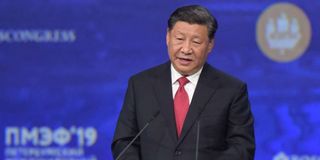China imposes new trade rules to protect business, security interests

Chinese President Xi Jinping gives a speech during a plenary session of the St. Petersburg International Economic Forum (SPIEF) in Saint Petersburg on June 7, 2019.
What you need to know:
- The ‘Rules on Counteracting Unjustified Extraterritorial Application of Foreign Legislation and Other Measures’, which take effect this month, will be a tool to protect Chinese business and security interests.
China has used the change of power in the US to impose new rules that will require its domestic firms to disregard foreign rules if deemed injurious to Beijing’s sovereignty.
The ‘Rules on Counteracting Unjustified Extraterritorial Application of Foreign Legislation and Other Measures’, which take effect this month, will be a tool to protect Chinese business and security interests.
A statement posted on the Chinese Ministry of Commerce said they will help “mitigate the impact of foreign legal measures, including economic sanctions and information requests, on Chinese economic and security interests.”
China had in the past passed similar legislation, regulating compliance with foreign criminal proceedings as well as exports controls.
The new rules are a response to a US stance against Chinese firms, which it accuses of lack of transparency on the data they collect from clients and on whether they are working with the Communist Party.
The Donald Trump administration, which left power only this week, had recently run into fight with Chinese companies such as ByteDance, owners of social networking site Tiktok. Only Court orders prevented Trump’s ban of Tiktok on US soil.
But the former President was able to ban transactions through Chinese payment platforms like Alipay and Tencent digital wallets.
Under the new rules, Chinese companies will be required to seek permission from Beijing before complying with foreign orders, bans or requests for information or certain orders.
Beijing argues unilateral decisions such as those of the US bans on Chinese firms have distorted rules of international commerce by subjecting the world to one view of the law.
Under the new rules, Chinese authorities decide under 30 days whether those foreign legislations should be honoured.
Controversy
Part of the controversy surrounding the laws is that they could potentially punish non-Chinese parties who may obey US sanctions by refusing to do business with Chinese entities.
While they may protect Chinese firms, some analysts think the law could boomerang on the Chinese for imposing a blanket demand on companies incorporated in other jurisdictions.
“A number of key aspects of the rules need to be clarified in future implementation regulations or as the first Prohibition Orders are issued — including whether Chinese branches or offices of foreign companies and China's overseas subsidiaries are subject to them, and how compensatory judgments against overseas companies could be enforced,” US law firm Morrison and Foerster, which also operates in Europe and Asia, said in an advisory note this week.
“It remains to be seen what types of extraterritorial measures will be within the rules’ scope. For example, US secondary sanctions — sanctions that do not involve US persons or other US touchpoints — imposed by the US government are clearly extraterritorial by design and are well within scope.”
It may mean that firms seeking compliance with US rules may continue disregarding Chinese demands because the new rules issued in Beijing do not change obligations of companies with US sanctions anywhere on earth.
National interests
The rules apply to circumstances that “improperly prohibit or restrict” Chinese individuals, companies, and institutions from conducting normal economic, trade and related activities with parties from the third countries.
This order came as China imposed sanctions on former Secretary of State Mike Pompeo and 27 other officials in the Trump administration for interfering with Chinese sovereignty. Pompeo had threatened sanctions on Chinese individuals for usurping democracy in Hong Kong.
“The rules were issued to defend national interests, avoid or mitigate the adverse impact on Chinese enterprises and maintain the normal international economic and trade order,” the Chinese Ministry of Commerce said.
Under the new rules, Chinese individuals or institutions should report to the ministry within 30 days of their business being affected by foreign compliance laws, after which authorities will assess "whether the compliance violates international law and basic norms of international relations’" and the possible impact on "China’s national sovereignty, security and development interests".
If such conditions are met, the ministry will issue an injunction against recognition, enforcement and compliance with the foreign laws and measures. The Chinese government will also take countermeasures if required.
With the US a key market for Chinese firms, it wasn’t clear whether firms could choose one side or keep a delicate balancing act. The US had earlier restricted Huawei on suspicions it was sharing information with the Chinese Communist Party.
This week, the New York Stock Exchange delisted US-traded shares of China Telecom, China Mobile and China Unicom over failure to comply with an executive order signed by President Donald Trump, the Asian News International (ANI) agency reported.





